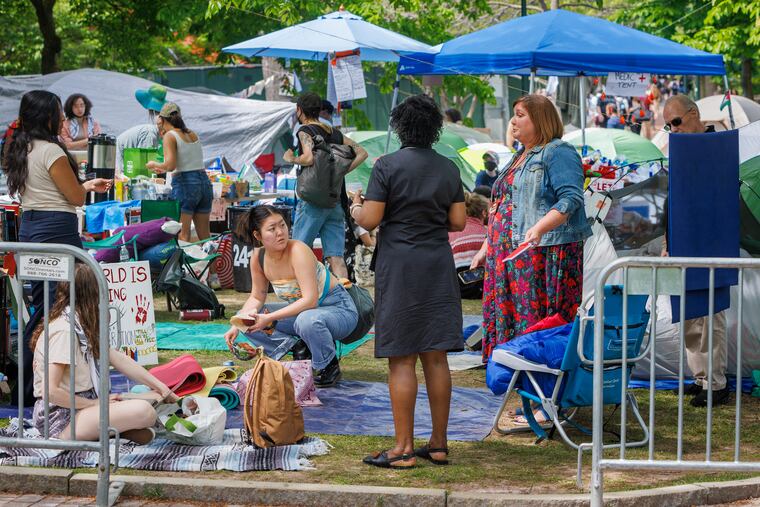Penn says it will pursue disciplinary action against encamped pro-Palestinian protesters
Defiant protesters refused to show identification to Penn officials on day six of the encampment that appeared headed to a day seven.

University of Pennsylvania officials said Tuesday that they were pursuing possible disciplinary action against pro-Palestinian protesters who have defied repeated orders to end their encampment, which showed every indication of extending to a seventh day on Wednesday.
“We have clearly communicated to the protesters in the encampment that they are in violation of the university’s policies,” Penn said in a statement, adding that any offenders, including faculty or staff, would be subject to “disciplinary processes.”
Thus far, the Penn protest has been absent of the turmoil and arrests that have occurred on other campuses, including Columbia and Princeton Universities, and no violent incidents or arrests have been reported at the West Philadelphia site since the tents were erected on Thursday.
At 9:35 p.m. Friday, interim president J. Larry Jameson had issued an order for the protesters to vacate the grounds “immediately.”
But four days after the cease-and-disband order, about 60 protesters remained at the College Green site and did not appear to be exactly cowering before the university’s threats. Penn encampment organizers said they met with university leadership Tuesday and were no closer to having their demands met.
They refused to show identification to officials from the Office on Open Expression, who were taking photos of the resisters. “Cover your faces,” an organizer shouted.
Those who failed to display IDs would be considered trespassers, a university employee told some of the encampment participants, all of whom refused to show identification. Soon thereafter, some of the campers began chanting “shame on UPenn.”
In a statement Tuesday, Penn encampment organizers accused the university of using ID checks as “intimidation tactics” in an effort to “distract non-Penn-affiliated persons from their right to protest.”
About 35 tents have remained at the site, along with copious supplies of donated bottled water and food, including doughnuts, pizza, popsicles, and fruit. In the last six days, the campers had experienced four seasons of weather, with temperatures in the 40s during the weekend mornings and up to 90 on Monday afternoon.
No confrontations have been reported between the protesters and counter-demonstrators, although about 25 pro-Israeli demonstrators appeared in the vicinity of the encampment during the weekend.
“It’s a tense environment,” Gabriel Steinberg, a Jewish student from Orlando, Fla., said Tuesday. For his part, Steinberg said, he is intrigued by the encampment, but understands why his friends, both Jewish and non-Jewish, are avoiding the area.
The protests at Penn and elsewhere have marched their way into the 2024 political campaigns. A Republican ad aimed at Sen. Bob Casey (D., Pa.) links Democratic support for loan forgiveness to campus unrest. “Students radicalized by the far left are acting like terrorists,” the ad says. “Now Joe Biden and Bob Casey want to pay off their student loans.” Similar ads are running in Wisconsin, Ohio, Montana and Michigan.
President Joe Biden’s administration has spoken out against the protests. But on Tuesday, Linda Thomas-Greenfield, the U.S. ambassador to the United Nations, who was visiting the William W. Bodine High School for International Affairs, told The Inquirer that she had encouraged the Bodine students to “make their voices heard.”
But, “I think if you want to have your voice heard, you can’t do it through violence. You can’t do it through hatred. And we’re seeing some of that.”
She said she met with six Palestinian students who “gave me a very hard time on what our policies are in Gaza.” She said the students were angry but respectful.
“I will say that and they had this sense that nobody is listening to them.”
The anti-war demonstrations have become almost daily occurrences across the country since the Oct. 7 Hamas terrorist attack on Israel.
The Penn encampment was making people pay attention to the war, said Sparrow — who declined to give a last name due to concerns about retaliation — who just completed a senior thesis. The Penn protesters are calling for the university to disclose its financial holdings, divest from any investments in the war, and provide amnesty for pro-Palestinian students facing discipline over past protests.
Sparrow said they are no stranger to protests, having participated in a six-week anti-fossil fuel encampment protest in 2022, but that they are still worried about repercussions. “I’ve done activism for so long,” Sparrow said, joined at the encampment by their charismatic pup named Skippy whom they deemed “a staple of Penn activism.”
But this protest has been special, said Sparrow: The demonstrators are making the war into “something you can’t turn away from.”
Inquirer staff writers Ximena Conde and Julia Terruso contributed to this article.